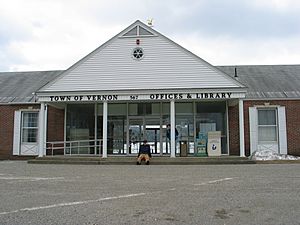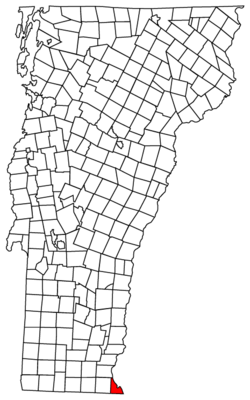Vernon, Vermont facts for kids
Quick facts for kids
Vernon, Vermont
|
|
|---|---|
 |
|

Vernon, Vermont
|
|
| Country | United States |
| State | Vermont |
| County | Windham |
| Communities |
|
| Area | |
| • Total | 20.0 sq mi (51.8 km2) |
| • Land | 19.4 sq mi (50.2 km2) |
| • Water | 0.6 sq mi (1.6 km2) |
| Elevation | 325 ft (99 m) |
| Population
(2020)
|
|
| • Total | 2,192 |
| • Density | 113/sq mi (43.7/km2) |
| Time zone | UTC-5 (Eastern (EST)) |
| • Summer (DST) | UTC-4 (EDT) |
| ZIP code |
05354
|
| Area code(s) | 802 |
| FIPS code | 50-74800 |
| GNIS feature ID | 1462234 |
| Website | vernonvt.org |
Vernon is a town in Windham County, Vermont, in the United States. In 2020, about 2,192 people lived there. Vernon was once home to the Vermont Yankee nuclear power plant. This was the only nuclear power plant in Vermont, and it closed in December 2014.
Contents
History of Vernon
The area that is now Vernon was first officially set up in 1672. This happened as part of a large land grant from Massachusetts. Later, in 1736, the land was given out again as part of a place called Fall Town. By 1753, it was known as Hinsdale.
When the Connecticut River became the official border between states, the original Hinsdale was split into two towns. One part became Hinsdale, New Hampshire, and the other part became Hinsdale, Vermont. The people living in Hinsdale, Vermont, wanted their own unique name. So, in 1802, the Vermont government changed the town's name to Vernon. It is believed the town was named after Mount Vernon, which was the home of President George Washington.
During the French and Indian War, a fort in Vernon called Fort Bridgman was attacked and burned down in 1755.
Geography of Vernon
Vernon covers an area of about 20 square miles (51.8 square kilometers). Most of this area is land, with a small part being water. The town is located on the southern and eastern borders of Vermont. It is north of Massachusetts and west of New Hampshire.
Vernon shares its borders with several other towns. To the north is Brattleboro, and to the west is Guilford. To the east, across the river, is Hinsdale, New Hampshire. To the south, Vernon borders the Massachusetts towns of Bernardston and Northfield. The town hall is about 4 miles (6.4 km) south of downtown Brattleboro.
Climate in Vernon
Vernon has a type of weather known as a humid continental climate. This means the town experiences big changes in temperature throughout the year. Summers are usually warm to hot, and they can often be humid. Winters are cold, and sometimes they can be very cold.
Population and People
| Historical population | |||
|---|---|---|---|
| Census | Pop. | %± | |
| 1790 | 482 | — | |
| 1800 | 480 | −0.4% | |
| 1810 | 521 | 8.5% | |
| 1820 | 627 | 20.3% | |
| 1830 | 681 | 8.6% | |
| 1840 | 705 | 3.5% | |
| 1850 | 821 | 16.5% | |
| 1860 | 725 | −11.7% | |
| 1870 | 764 | 5.4% | |
| 1880 | 652 | −14.7% | |
| 1890 | 567 | −13.0% | |
| 1900 | 578 | 1.9% | |
| 1910 | 606 | 4.8% | |
| 1920 | 556 | −8.3% | |
| 1930 | 609 | 9.5% | |
| 1940 | 559 | −8.2% | |
| 1950 | 712 | 27.4% | |
| 1960 | 865 | 21.5% | |
| 1970 | 1,024 | 18.4% | |
| 1980 | 1,175 | 14.7% | |
| 1990 | 1,850 | 57.4% | |
| 2000 | 2,141 | 15.7% | |
| 2010 | 2,206 | 3.0% | |
| 2020 | 2,192 | −0.6% | |
| U.S. Decennial Census | |||
According to the census from 2000, there were 2,141 people living in Vernon. The population has grown over the years, reaching 2,192 people by 2020.
The people living in Vernon are spread out in terms of age. About 27.2% of the population was under 18 years old. About 13.5% of the people were 65 years old or older. The average age in Vernon was 39 years old.
Education in Vernon
Vernon is part of the Windham Southeast Supervisory Union. This group helps manage the schools in the area.
- Vernon Elementary School is a public school in Vernon. It teaches students from kindergarten up to sixth grade.
- For middle school, students go to Brattleboro Area Middle School (BAMS).
- For high school, students attend Brattleboro Union High School (BUHS).
- There is also the Windham Regional Career Center. This center helps students learn skills for different jobs and careers.
Notable People from Vernon
Many interesting people have come from Vernon, Vermont. Here are a few:
- Karen Carroll: She is a Justice on the Vermont Supreme Court. This means she is one of the most important judges in the state.
- George Howe: He was a lawyer who served as the State's Attorney for Windham County. He was also a United States Attorney for Vermont and a member of the Vermont Senate.
- Jonathan Hunt: He was a US congressman, meaning he helped make laws for the country in Washington, D.C.
Vermont Yankee Nuclear Power Plant
Vernon is known for being the location of the Vermont Yankee nuclear power plant. This plant produced electricity using nuclear energy. It was the only nuclear power plant in the state of Vermont. The plant officially stopped working on December 29, 2014.
See also
 In Spanish: Vernon (Vermont) para niños
In Spanish: Vernon (Vermont) para niños
 | Anna J. Cooper |
 | Mary McLeod Bethune |
 | Lillie Mae Bradford |


